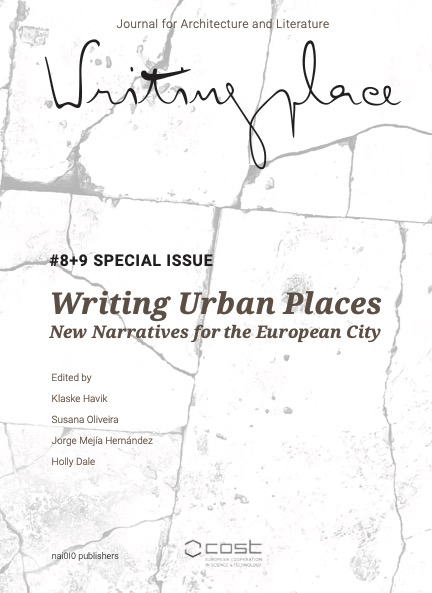Skopje
Skopje Brutalism Trail: Rebuilding Social Fabric through Architecture and Performance
DOI:
https://doi.org/10.7480/writingplace.8-9.7259Abstract
The article reflects the city of Skopje from the perspective of the workshop Skopje Brutalist Trail held in late September 2022 as a part of the activities focused on fieldwork within the COST Action Writing Urban Places. The workshop departs from the general topics of brutalist architecture and solidarity, both highly relevant and related to the city and its culture. The idea of the workshop is to offer a new viewpoint by means of civic participation and activism in order to reassess forms of solidarity in the process of community building. The workshop engages creative writing and performing arts to develop urban narratives that link architectural legacy, in-situ findings and memories of people and places, juxtaposing past, present and future narratives.
References
Gordon W. Allport, The Nature of Prejudice (Boston: Addison-Wesley, 1954).
Gaston Bachelard, The Poetics of Space (New York: Penguin Books, 1958).
Corelia Baibarac and Doina Petrescu, ‘Co-design and Urban Resilience: Visioning Tools for Commoning Resilience Practices’, CoDesign 15 (2019), 91-109.
Reyner Banham, The New Brutalism: Ethic or Aesthetic? (London: Architectural Press, 1966).
Jon Bannister and Ade Kearns, ‘The Function and Foundations of Urban Tolerance: Encountering and Engaging with Difference in the City’, Urban Studies 50 (2013): 2700-2717.
John Dixon, ‘Contact and Boundaries: “Locating” the Social Psychology of Intergroup Relations’, Theory & Psychology 11 (2001): 587-608.
Lorenzo Chelleri, ‘From the “Resilient City” to Urban Resilience: A Review Essay on Understanding and Integrating the Resilience Perspective for Urban Systems’, Documents d’Analisi Geografica 58 (2012), 287-306.
Juan A. García-Esparza, ‘Narrating the Urban Fabric of Our Historical Towns’, in Sonja Novak et al. Writingplace 6 City Narratives as Places of Meaningfulness, Appropriation and Integration (2022), 120-135.
Klaske Havik, Urban Literacy. Reading and Writing Architecture (Rotterdam: nai010, 2014).
Filip Jovanovski et al., ‘Performing (on) Architecture through Theatre Protocols’, in: Carlos Machada e Moura et al. (eds.), REPOSITORY: 49 Methods and Assignments for Writing Urban Places (Rotterdam: nai010, 2023), 118-121.
Charles Landry, The Creative City: A Toolkit for Urban Innovators (London: Comedia/Earthscan, 2000).
OKNO, Kica Kolbe, ‘Бетовенхале во Бон и Универзална во Скопје – паралели и идеи’ [Beethovenhalle in Bonn and Universal Hall in Skopje – Parallels and Ideas], https://okno.mk/node/85717, accessed 19 July 2023.
Juhani Pallasmaa, The Eyes of the Skin (Chichester: Wiley, 1996).
Georges Perec, An Attempt at Exhausting a Place in Paris, translated by Marc Lowenthal (Cambridge, MA: Wakefield Press, 2010 [1982]).
Reana Senjković, Svaki dan pobjeda: Kultura Omladinskih Radnih Akcija [Every Day a Victory: The Culture of the Youth Work Actions] (Zagreb: Institut za etnologiju i folkloristiku, 2018).
Rudi Supek, Omladina na putu do bratstva: Psihosociologija radne akcije [Youth on the Way towards Brotherhood: Psychosociology of the Work Action] (Belgrade: Mladost, 1963).
United Nations, SKOPJE RESURGENT: The Story of a United Nations Special Fund Town Planning Project (New York: United Nations, 1970), 312-315.
Antony Vidler, ‘Brutalism: Aesthetic or Ethic?’, CLOG ‘BRUTALISM’ 6 (2013).
Pnina Werbner, ‘The Dialectics of Urban Cosmopolitanism: Between Tolerance and Intolerance in Cities of Strangers’, Identities: Global Studies in Culture and Power 22 (2015), 569-587.
Ophélie Véron, ‘Contesting the Divided City: Arts of Resistance in Skopje: Contesting the Divided City’, Antipode 48 (2016).
Louis Wirth, ‘Urbanism as a Way of Life’, The American Journal of Sociology 44 (1938), 1-24.
Downloads
Published
How to Cite
Issue
Section
License
Copyright (c) 2023 Marija Mano Velevska, Slobodan Velevski, Aleksandar Staničić, Blagoja Bajkovski, Holly Dale

This work is licensed under a Creative Commons Attribution 4.0 International License.



